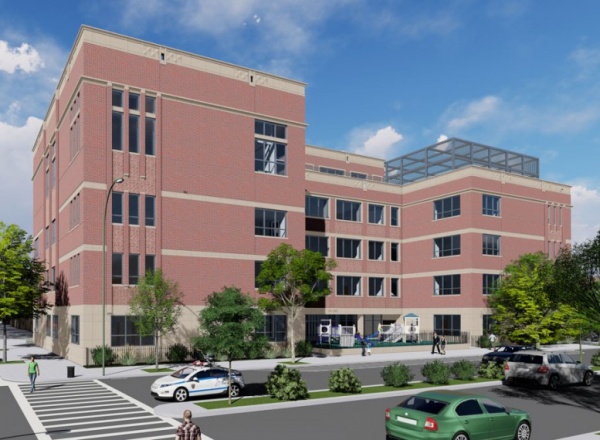
Rendering of P.S. 398
Sept. 3, 2019 By Allie Griffin
As if lead paint inside classrooms wasn’t worrisome enough, a new report shows that 39 public schools across Queens are near heavily polluting roadways.
Booming residential development, coupled with overcrowded school districts has made it difficult to find spaces large enough to build new schools, often leading the city to build on less-than-desirable lots near heavily trafficked roads.
These busy roads can potentially expose children and educators to high levels of pollution and possible health effects.
According to a new analysis from home search platform Localize.city, 244 public schools across the city are located within 500 feet of major highways and more are being built.
This week, P.S. 398 in Jackson Heights welcomes 476 students to a new $60 million five-story building that is just 200 feet from the Brooklyn Queens Expressway, according to the study.
In general, pollution levels are highest in areas within 500 feet of major roads and prolonged exposure to vehicular air pollution is linked to negative health effects such as impaired lung development in children and increased cancer risk, according to the Environmental Protection Agency.
“When parents debate how to rank their child’s pre-K programs or elementary schools, they often pay attention to the quality of the teaching, what kinds of art and enrichment is available and whether there’s a nice outdoor playground,” said Liat Halpern, an urban planner at Localize.city.
“They might not pay attention to hidden hazards of air quality, even though pollution could have a big impact on their children’s ability to learn. After all, kids attend city schools 180 days a year, often running around at recess every day, breathing in the air — and potentially toxic fine particulate matter,” Halpern continued. “We think it’s important for parents to have this kind of information when they’re making decisions about where to live because often their choices are linked to nearby schools.”
A recent working paper from the National Bureau of Economic Research hypothesized that students who switch to schools with higher levels of traffic pollution tend to experience declines in test scores, increased behavioral incidents and greater absences.
The EPA recommends reducing traffic-related pollution exposure by upgrading filtration systems in classrooms.
The 39 schools in Queens with pollution risk according to Localize.city‘s analysis are listed below:
1. P.S. 152 Gwendoline N. Alleyne School
2. J.H.S. 74 Nathaniel Hawthorne
3. George Washington Carver High School for the Sciences
4. P.S. 143 Louis Armstrong
5. P.S./I.S. 266
6. P.S./ IS 178 Holliswood
7. Queens High School of Teaching, Liberal Arts and the Sciences
8. Queens Preparatory Academy
9. P.S. 220 Edward Mandel
10. Thomas A. Edison Career and Technical Education High School
11. P.S. 206 The Horace Harding School
12. The Riverview School
13. Queens Academy High School
14. Success Academy Charter School – South Jamaica
15. P.S. 38 Rosedale
16. P.S. 159
17. High School for Arts and Business
18. Community Voices Middle School
19. Preparatory Academy for Writers: A College Board School
20. P.S. 79 Francis Lewis
21. P.S. 131 Abigail Adams
22. P.S. 196 Grand Central Parkway
23. The Gordon Parks School
24. P.S./I.S. 208
25. P.S. 143 Louis Armstrong
26. Excelsior Preparatory High School
27. Academy of the City Charter School
28. P.S. 124 Osmond A. Church
29. J.H.S. 216 George J. Ryan
30. J.H.S. 202 Robert H. Goddard
31. Maspeth High School
32. P.S. Q004
33. P.S. 377
34. Academy for Careers in Television and Film
35. Collaborative Arts Middle School
36. Francis Lewis High School
37. Hunters Point Community Middle School
38. Robert H. Goddard High School of Communication Arts and Technology
39. P.S. 251 Queens
5 Comments







An enlightening article which should make parents think about the air their children breathe when at school. Here is another thought along the lines of what children’s lungs are exposed to. While children may be in school for a number of hours every five days for 180 days per school year (as stated in the above article), the same children who live in apartments in Jackson Heights, Elmhurst and Corona (for that matter anywhere else in NYC) are exposed to toxic secondhand smoke pollution for the majority of the day for 365 days a year unless their landlord has transitioned to a smokefree apartment policy. Shouldn’t there be a similar, if not more, concern of living in their home that shares up to 65% of the air with people who smoke in their apartment? The answer is an emphatic “Yes.”
Is there a street, avenue, boulevard or road in NYC that is not heavily polluting? The school buses the children ride on create more pollution and are a health hazard over the roads that simply run through school zones. This is absurd.
If you live in a city,you will be exposed to air pollution,if you want fresh air move out of the city.common sense
Just another reason why we were never meant to live in cities. We should be living like our ancestors did , out in the wild with the fresh air, horses, livestock, plants and farmland, less crime, and a less stressful life.
Plant more trees, And don’t let the cars , school buses idle